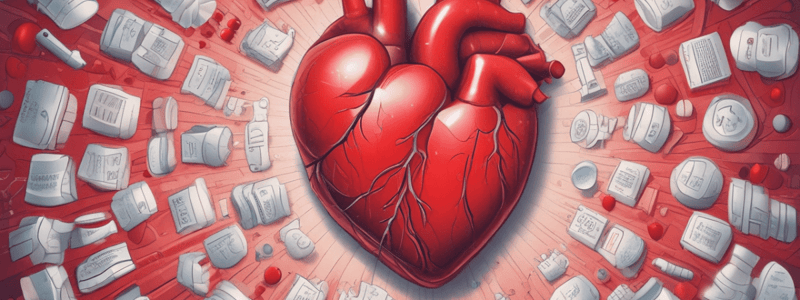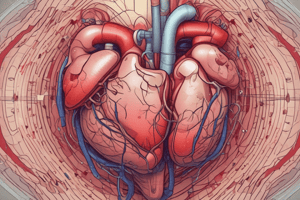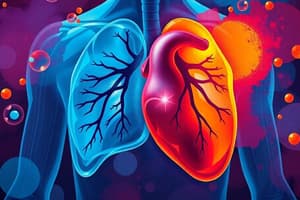Podcast
Questions and Answers
What is the primary purpose of angina medication?
What is the primary purpose of angina medication?
- To improve respiratory function
- To increase heart rate
- To alleviate chest pain (correct)
- To reduce blood pressure
Which of the following can be a common form of angina medication?
Which of the following can be a common form of angina medication?
- Antihistamines
- Beta-blockers (correct)
- Antibiotics
- Antidepressants
What is a potential side effect of angina medications?
What is a potential side effect of angina medications?
- Dizziness or lightheadedness (correct)
- Increased appetite
- Enhanced vision
- Improved metabolism
In what situations might angina medication be prescribed?
In what situations might angina medication be prescribed?
What lifestyle change may complement angina medication?
What lifestyle change may complement angina medication?
Flashcards are hidden until you start studying
Study Notes
Angina Medication Overview
- Designed primarily to alleviate chest pain associated with angina, improving blood flow to the heart.
- Aimed at managing symptoms and reducing the frequency of angina attacks.
Common Forms of Angina Medication
- Nitrates: Often the first line of treatment, such as nitroglycerin, used for immediate relief.
- Beta-blockers: Help to reduce heart workload and lower blood pressure.
- Calcium channel blockers: Relax blood vessels, reducing heart work and relieving angina.
Potential Side Effects of Angina Medications
- Nitrates may cause headaches, dizziness, or a rapid drop in blood pressure.
- Beta-blockers can lead to fatigue, cold extremities, or sleep disturbances.
- Calcium channel blockers might result in swelling, constipation, or dizziness.
Situations for Prescribing Angina Medication
- Prescribed during episodes of acute angina or for patients with chronic angina symptoms.
- Used in conjunction with lifestyle changes or other treatments, such as cardiac rehabilitation.
- May be indicated for patients undergoing cardiac procedures or surgeries.
Complementary Lifestyle Changes
- Regular exercise and physical activity tailored to individual tolerance levels.
- Adopting a heart-healthy diet, emphasizing fruits, vegetables, whole grains, and lean proteins.
- Stress management techniques, such as yoga or meditation, to help decrease angina episodes.
Studying That Suits You
Use AI to generate personalized quizzes and flashcards to suit your learning preferences.




